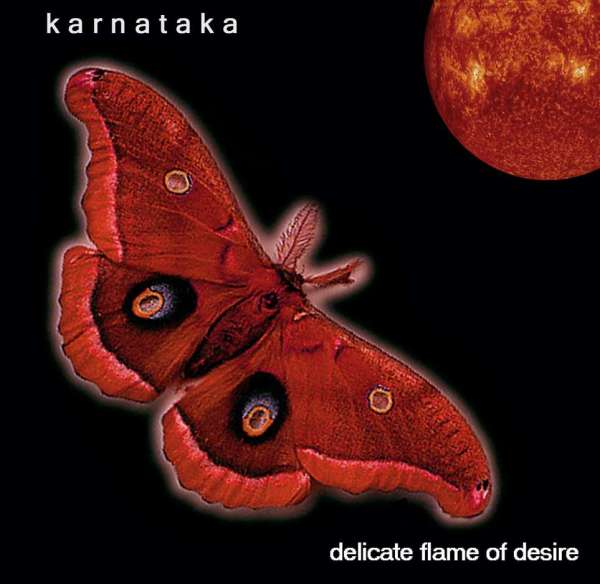This write up is very verbose and I expect a lot of people will think it
needs a good edit but from my point of view it is better to let fans read all
the detail they want than to cut it down. I would hope that people who find
it too long can just skim the bits they are not interested in. I would really
appreciate feedback both good and bad
on this interview as I am aware my English and presentation aren’t very good
but I would hope the overall content is OK.
The subsections of the interview are:
Origins
Song Writing
Playing Live
Saxophone
Miscellaneous
The First Album
The Storm
Supporting Tours
Promotion
Music Scene
DVD appearances
The Delicate Flame Of Desire
Set Selection
Rachel
Jonathan
Ian
Flat Eric
On a nice sunny day just after Karnataka had finished mastering "Delicate
Flame Of Desire" in Abbey Road Studios Jon Hinchliffe went down to Swansea
to interview the group. Present were Ian Jones (Bass Guitar), Rachel Jones (Vocals)
and Jonathan Edwards (keyboards).
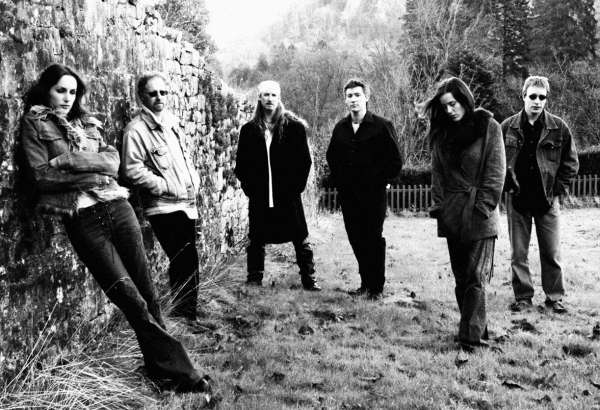
Origins
JH – How did the band start?
Ian – Jon, Rachel and myself go back 11 or 12 years. We started off as a three
piece just writing our own stuff. We did a few gigs as a three piece as we didn’t
have any guitar or drums. We started off because we liked song writing. We did
that for a few years and then we did our own separate things in various bands.
Around 1997/1998 we decided we wanted to record the songs we had written. We
didn’t have a band together as such it was just a project we decided to undertake
to record the songs we had written. I built a studio in the house and bought
a mixing desk etc. We just set about recording the songs we had written together
and these formed the first album. As soon as we had recorded the songs we all
felt it would be good to take the stuff out and start gigging. We had formed
the band very quickly.
We had played with Paul Davies our guitarist a few times in rehearsals and
we had played with Gavin Griffiths our drummer in other bands. So we just started
recording together, it all sounded very good and we decided to take it from
there. When we recorded the first album it was pretty much just for our own
pleasure. There was no thought at the time of releasing it. At gigs people were
asking us for copies of it so we were just running them off on a CD-Writer as
requested.
It was recommended to us that we send a copy off to Martin Hudson at the Classic
Rock Society. Martin reviewed the album and he gave us a very positive review.
He could see what the band were trying to do. It was Martin who gave us our
first break really as he did the album review and then offered us a gig for
the Classic Rock Society in Rotherham. This was back in June 1999 as support
to Re-Genesis and we haven’t really looked back from there. We were offered
another support with Jump in October 1999 and we then started writing the material
that would eventually appear on our 2nd album "The Storm".
JH – Where does the band name come from and what does it mean?
Ian – That’s a bit of a long story. When we recorded the first album there was
no band name at all. We didn’t even think about it until we had finished the
project. We were just trying to think of something that captured the nature
of the music a little bit but we also wanted it personal to the band. I had
been out to India in 1995 and 1996 to the state of Karnataka in South India
and I had a pretty amazing experience out there. There had been a kind of eastern
influence on some of the tracks so the name just seemed to fit. What we didn’t
realise was the difficulty people would have pronouncing it ever after!
JH – Why do you choose to play the style of music that you do?
Jonathan – Because nobody else does!
Ian – Yes really that’s it. It is different. We don’t think of it as retro
we like to think of ourselves as a kind of contemporary band. We are just trying
to push rock in a slightly different direction. There are lots of influences
within the band because I think our tastes vary quite a bit. I suppose the attitude
towards the way we write stuff could perhaps be compared to some of the older
bands in that when we write songs we go beyond the standard verse chorus verse
chorus, middle 8. We try to push the song arrangements in a more interesting
direction or at least a more interesting direction for us.
Jonathan – But thinking back even when it was just the three of us right at the start
the music we were playing wasn’t like any of the other bands in Swansea or necessarily
what you would hear on the radio. Certain influences came through but we just
wanted to do something different that we enjoyed. We then hoped that if we enjoyed
it, it would then appeal to others.
Ian – I think when we are writing the songs just take on their own form. It’s
not a case of let’s try to write a song in this kind of mode or a song that
sounds like that. We just start off with an idea and sometimes very quickly,
and sometimes not very quickly, it will take on it’s own direction. In fact
we felt this when we were recording the new material. We could just feel that
a song wanted to go in a certain direction. I suppose the way you take a song
is influenced by the stuff you listen to to a degree. Sometimes it is very obvious
the way a song needs to sound and that is kind of the way a lot of our stuff
is written. It is as if the song it waiting to be written and you are just helping
it along to that stage rather than forcing it along to a preconceived idea.
Jonathan – I know
it sounds like a cliché but it is as if the song is there and rather than you
writing it you just find it. It just flows out. I think with a lot of bands
that don’t follow the verse chorus structure it almost sounds like they have
just stuck lots of unrelated bits of music together. There doesn’t seem to be
any organic flow to the music it just seems to be we have got this far so "lets
put a 7/8 section in for 5 bars" and it sounds rather jerky to me. I think
although our songs are very diverse they don’t sound like bits tagged together
they sound like a whole piece.
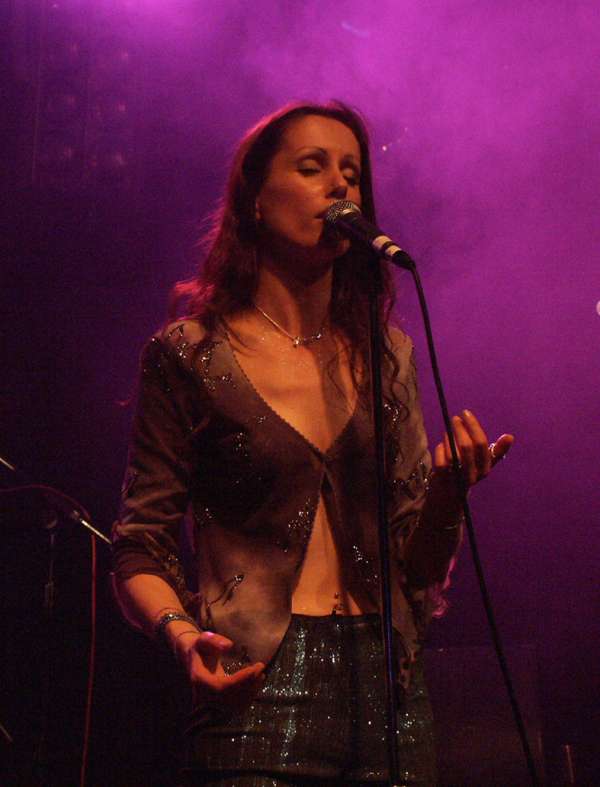
Photo By Chris Walkden
JH – Who would you say your influences are then? Or what music do you listen
to.
Ian – All sorts really. I still listen to some of the older bands. "Yes"
are still one of my favourite bands but my tastes have diversified quite a bit.
I listen to quite a bit of folk, Kate Rusby and Richard Thompson. I still listen
to Genesis and Peter Gabriel. Also Deep Forest, lots of things really.
Rachel – I have similar tastes really. I grew up listening to a lot of female
vocalists which I loved. So probably Abba in my childhood. I have listened to
a lot of Kate Bush also Clannad. Very much stuff that had a lot of harmony layers.
I used to sing along and make up a new harmony as I was going along. I like
everything from Def Leppard to Duran Duran, Genesis, Yes and Pink Floyd. I like
a bit of everything.
Jonathan – It’s the same for me. I listen to a broad spectrum of stuff. In my teens
it was very Yes, ELP and Led Zeppelin. These days I don’t tend to buy or listen
to a lot of Rock music. It tends to be world music or folk music. Also people
like Peter Gabriel or Sting who had rock origins but are now of a broader church.
If you listen to our music a lot of the way we do our time changes and the rhythms
we use are very like the things you find in folk music but the music itself
isn’t actually like folk music. The influence just comes through in the time
changes and rhythms. I think there are Jazzy things we use as well but I wouldn’t
say our music is anything like Jazz. It is just using those sorts of influences
in the way we write.
JH – So how would you describe your music?
Jonathan – Oh the question we hate!
Rachel – I don’t think you can.
Jonathan – It’s big.
Ian – Yes it is big and atmospheric.
Rachel – It is very melodic. I think someone listening to one of our tracks especially
on the new album will be able to remember the music after only one listen because
it is so melodic. At the same time our music is something that rewards continued
listening because it has got other layers and depths to it as well. It’s got
a surface people will latch onto straight off but if they stick with it they
will find it has a greater feel to it as well.
Ian – I suppose a big part of our audience are progressive rock fans. Sometimes
we get categorised as one of the new prog rock bands and we don’t mind that
at all. I am a big fan of some progressive rock. With some of the prog rock
stuff that comes out now it is very retro and it sounds like it is more of an
attempt to sound like the bands of the past with no real attempt to be progressive.
So it is like it is Progressive with a capital "P". ie. a name given
to bands of a certain style instead of a name given to bands that try to push
their music forward. I personally have always seen progressive as a term that
can be applied to any musical Genre. If you have an artist who plays folk, jazz
or rock if they are trying to do something really different in their genre then
I have always seen that as progressive. On the new album I think there is stuff
that is progressive but not in the “sounds like” way.
Jonathan – It was interesting to read an article recently that described Radiohead
as being a progressive band. They don’t sound like a prog rock band but they
are progressive in doing something musically that is kind of stretching the
boundaries of pop rock music and they don’t sound like anyone else.
Ian – I think another band like that are Mercury Rev. They have done some very
different stuff. Clannad have also taken folk music in a completely different
direction and I guess they could be considered progressive too. They have taken
a style of music and gone off on a tangent and done something really different
with it.
Jonathan – We have always found it difficult to give other bands as a term of reference
when people ask us what our music is like. On one hand you want people to hear
we are like another band they like so that they come and listen to us but on
the other hand it is also a limiting factor. When we were in the studio mixing
someone came in and said, "Oh you sound like a Celtic Floyd.” That was
kind of nice but it doesn’t sum up everything we are about.
JH – The line-up for the band has been the same since you first started hasn’t
it?
Ian – Yes except of course that Anne-Marie has now joined us as a sixth member.
JH – Do you consider yourselves semi-professional?
Ian – We consider ourselves very professional. (Laughs)
JH – You’re not able to make the band pay full time?
Ian – Not really no. Some of us are still working.
Jonathan – But it’s definitely going in the right direction. When we did the first
album we never dreamed we would be able to make a living from music. We just
hoped some other people might like the album. Now we do make money at it so
it is going the right way and it is in all our dreams that we can just make
enough to allow us to keep making music. We don’t necessarily want to be rich
and famous, just make enough money to keep doing it.
Ian – We
are at the stage now where we would like to do a lot more touring, and with
various members of the band working it’s not always easy to juggle the music
and the jobs .
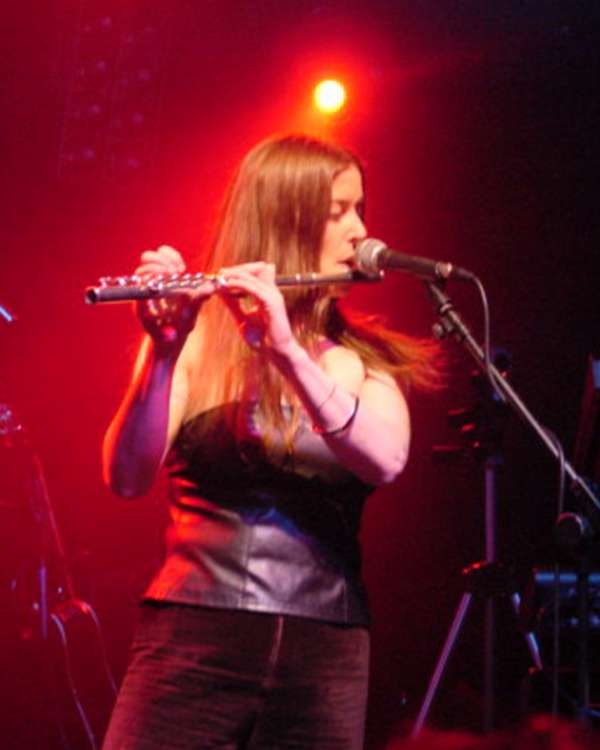
Photo By Chris Walkden
JH – I get the impression there are a lot of people that
still don’t appreciate that a lot of bands like you still have to work.
Ian – Yes I get e-mails from people that just assume that this is what we do
full time.
Rachel – We did a gig, probably a London one last year, where someone came up to
us at the end and said "Oh it must be nice just travelling from gig to
gig and spending all that time on a tour bus." I just thought, "You
have no idea."
Jonathan – It actually means you are getting back home at 5.30 or 6 in the morning,
having 2 hours sleep and then getting up for work. If you think about 6 members
in a band and the average wage for one person, we would need to make that plus
travelling expenses in order to make a living out of the music.
Rachel – It is not like it used to be.
Jonathan – Even the people you know and see on TV only just make enough to keep doing
it. They don’t all have guitar shaped swimming pools and mansions.
Ian – It is surprising the number of musicians I know that are running studios
or teaching in order to subsides their bands.
Song Writing
JH – Who writes the lyrics?
Rachel –
Me! That’s my job.
JH – What do you base them on?
Rachel – It depends, I am one of those people that likes to hear the music and
then write the lyrics to go with it. I have written chunks of lyrics, which
I then try adding to music but I tend to find it easier to hear something these
guys, have come up with and get into the feel of the music and then see where
it takes me. I like to write about things that people can identify with. That
is really important to me. I like to think that people can listen to the songs
and read something into them that is personal to them rather than tell a story.
Having said that "The Storm" was a story based song. I just like it
to be open emotions and feelings and things that people can read something into.
JH -How long do you spending writing lyrics for a song once you hear a backing?
Rachel – It depends, some songs are very instant. For instance "The Journey"
from "The Storm" came very, very quickly. But usually I might spend
a couple of days writing the melody to go with the song and then set about thinking
of the lyrics to go with the melody.
JH – Do you ever think "I would like to write a song
on a certain topic and then keep it in mind for future music?"
Rachel – The title track of "The Storm" was very much like that. I really
liked the idea of doing a shipwreck story. That was influenced by the shipwreck
I have seen 100’s of times down on the Gower Beech near Swansea.so it is a bit
of both. Sometimes I think up an idea and write about it later but mainly I
get the feel of a song and see what it creates.
JH – Do you ever write the music too?
Rachel – Sometimes it is something we all do together. The three of us will sit
down with a guitar and a keyboard, but generally Ian and Jon come up with the
musical ideas first and I will add to them as we go along.
JH – So you’re not like Jon Anderson of Yes who has very
rough ideas that he leaves the musicians of the band to decipher and work out
into proper music and structures?
Rachel –
No not normally but I do sometimes have bits of ideas that I will hum for them.
Jonathan – I think on all the songs we have released, all the vocals melodies are
by Rachel. It is not just the lyrics. We will have a chord structure in there
and changes but the actual vocal line and harmonies are all written by Rachel.
So without her musical input the songs wouldn’t be what they are
JH – Can we go into more detail about how the first album came about?
Ian – We
wrote the songs over a couple of years with other bands but we had never recorded
them. We had played them live but all we had as a record of them were live or
practise recordings. They were just recorded on a cassette player sat in the
corner. Basically I thought it was a shame that we weren’t going to have good
recordings of these songs to look back at. I therefore started getting interested
in home recording and started reading magazines like Sound On Sound. Computers
were just getting powerful enough to be able to record to hard disc and I needed
to buy a computer for a university course at the time. Because I was reading
these Magazines I realised I could put a basic studio together without much
extra expense. I bought a small Mackie mixing desk some microphones and stuff
like that. I didn’t really have a clue what I was doing. I was reading books
on recording but I didn’t have any practical experience and just through trial
and error I just started recording the album.

Photo By Chris Walkden
JH – How do you set about writing songs? Do you constantly
write or just write to get an album out?
Ian – It is usually a constant thing but we have had a bit of a break recently
because we have been recording the new album. Jon and I normally write stuff
together and then bring it into a rehearsal. Sometimes they are complete ideas
and sometimes they are part ideas, which we then let evolve.
Jonathan – I think pretty much individually we will sit down and play an instrument
for a couple of hours and something either comes out or it doesn’t. But we also
have sessions where we write together. We went away to a cottage in Solva (a
coastal village in West Wales) for the weekend and just took an acoustic guitar
and a keyboard. We would go down the pub, have a drink and then come back
and play – a lot of good stuff came out of that. .
Rachel – It was really good.
Ian – I tend to write in phases so I might go for quite a while knocking ideas
about and I don’t feel anything is really happening and then I might get a couple
of weeks where I get lots of ideas. It is just the sort of thing you can’t force.
Even though I tend to play bass in the band I write mainly on the guitar. I
play just because I enjoy playing and the ideas just come out of that.
Jonathan – I am sure we both have quite a store of these sections that are really
good but don’t actually work with anything else. Very often we will come up
with an idea and then we will think "Ah yes that thing we did 9 months
ago will fit with this".
Ian – I think one of the things we are good at is knowing when not to force
an idea. If we have a strong idea but we don’t feel we have got enough there
to compete a song, rather than just tack something to make it into a song, we
tend to keep that idea back and wait and see if we ever write anything else
that we feel will go with it naturally. We don’t dilute a good idea we just
wait for something else to come along.
JH – Do you always write as a pair or do you sometimes come up with complete
ideas for a song?
Ian – We both write individually and as a pair. Probably the best stuff we have
written was written as a pair.
Jonathan – I think as we go forward now we want to promote the idea that anyone in
the band that wants to be involved in the writing, can be
JH – For the new album you have been trying out least two
of the songs live. Do you always try out songs live first?
Ian – On
the new album there are 3 songs that have never been performed live and a couple
of songs that we have performed live but we have radically changed when recording
them.
Jonathan – When we did "The Storm" we played the songs live before we recorded
them but not a tremendous amount so what we recorded was more or less how we
knew the songs would be. This time we have taken 8 months to record the album
and during that time we have been playing live constantly. Some of the songs
we have actually been playing live for about a year and that has been good because
the strengths and weaknesses of the songs have come out live. “Heart Of Stone”
in particular has changed four or five times. In fact on the DVD recorded version
of this song the last third of this song is completely different to the recorded
version on the new album. When we were recording it we just decided "this
isn’t really working how we wanted it to". It worked live but in the studio
it didn’t seem right so we changed the end of it dramatically. So it has been
nice to play the songs live and get into them for a long time and then change
them as required.
JH – Does Paul work out his own guitar solos?
Rachel – Yes, although when we are recording and arranging we will all contribute ideas,
whether it’s chord sequences, song structures, rhythms or solos.
JH – But that comes under arrangements by Karnataka does it?
Ian – Yes Jon and I tend to work out the song structure chord wise. Paul’s
way of working is he likes a bass upon which to write his guitar solos. When
we start structuring a song we get to a point where we feel a solo is going
to work and Paul will then start working on ideas on top of our framework. Sometimes
when we are jamming out our ideas Paul will come up with something on the spot.
It’s part of the group written stuff. Other times he will take a song away and
work on a solo that way.
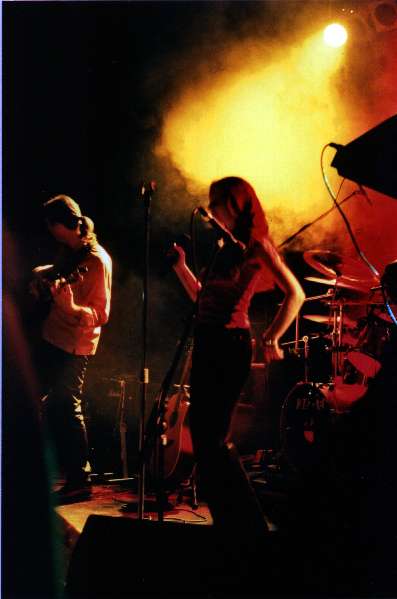
Photo By Mark Cowmeadow
Playing Live
JH – When you are playing a song from, say the first
album now, do you like to change it because you get bored of playing it the
same way all the time or does it just naturally change it’s own way because
ideas occur as you are playing gigs and you just keep the ideas through repetition
each night?
Jonathan – All of the above.
Rachel – We have done bits of everything.
Ian – I think the band album by album have developed as musicians. The song
writing has developed to so what we find now when playing tracks from the first
album is that we think "Oh we would have done that differently now".
So we do change stuff. I suppose it is partly because we are want to keep the
songs fresh from a playing point of view and partly because we feel we could
do it better now.
Jonathan – I think also when we look back at the first album and "The Storm"
we think there are things we would do differently now but that is where we were
at the time so to go back and re-record the songs seems a bit pointless. However
playing live does let you go back and change things you didn’t like.
Ian – Although,
we probably haven’t changed that much. I think on "It Must Be The Devil"
we have dropped a verse to make it punchier. "Crazy" is fairly close
to the album version. What we tend to find is that if we aren’t happy with
a song or just bored with playing it too often we’ll just stop playing it altogether.
Jonathan – But it has been nice bringing in old songs live. Three or four months
ago we started playing "There Must Be A Way" from the first album
and we had never played that live. It therefore felt really fresh after four
years. It’s nice to go back to stuff we haven’t done for a long time.
JH – Do you ever think it would be nice to rearrange a song just for the hell
of it?
Ian – I think there is always that temptation. With the first album the production
quality isn’t that fantastic even though we feel the songs are strong. But at
the same time we just feel that represents where we were at that period in time
and in some ways it is pretty nice to leave it as it is. That is how we were
then and we are certainly not embarrassed by it. I listen to it and I think
how I would record it now and sonically it would sound better but perhaps that
is taking the spirit away from what it was. I like listening to most bands early
albums because it is raw.
Rachel – It shows how much a band has changed over a period of time.
Ian – Yes and I think when a song is good it always shines through whatever
kind of production it was given.
Jonathan – I think live we will probably work with arrangements of the old
songs. It will keep it interesting for us. It is good to try different
things. We have been doing "Run To You" from the first album with
a kind of sequenced percussion. That was interesting to do with an old song.
Ian – I think if we do a live album that would be a good opportunity to revisit
the older songs and try out different arrangements. But we have always kind
of thought that was that and let’s move forward.
JH – When did you first start gigging as Karnataka?
Ian – The end of 1998 just after the first album.
JH – Have you always played your own material or did you
do covers in the set when you first started?
Jonathan – This band has only ever done one cover. And that was " I Know What
I Like (In Your Wardrobe)." We did that because the Classic Rock Society
gave us our first gig and we supported Re:Genesis. Later, at our first headline
gig for the CRS we played it as an encore as a kind of thank you to them for
giving us that original support slot. It is also a great track that we really
liked. It’s the only occasion we have ever played a cover.
Ian – I think there is always a temptation when playing covers that people will
stick a label on you. I think if we covered a Floyd track or a band with a female
vocalist such as Fleetwood Mac or Kate Bush we leave our music open to comparisons
that we don’t really want. We would rather people just listen to our music and
make up their own minds.
Jonathan – You also have to be very careful if you do a cover because I have been
to a lot of gigs where a band plays 95% of their own music and then a cover
at the end of the gig and people go away saying the best track was the cover.
We feel our music is strong enough to stand on it’s own.
Ian – We are not against doing covers. We might decide sometime to take somebody’s
song and do something radical with it.
Jonathan – I feel
the same, I personally don’t see the point of doing someone else’s song if you
are going to do it the way they do it. You might as well just put it on the
sound system in the venue.
JH – The reason I asked was because it could be an icebreaker
to an unfamiliar audience. What sort of venues did you play when you first started
playing live?
Ian – We played in pubs.
JH – So have you ever had trouble getting the crowds interested?
All Three – Oh Yes.
Ian – I am sure the great difficulty every band doing their own material faces
when they start gigging is convincing the venue owner to put you on. They are
naturally going to ask what stuff you do. When we say we are going to do our
own that is always a major hurdle to get over. Most venues prefer cover bands.
Recent years have seen a proliferation of tribute bands and that is because
from the venue owner’s point of view they just want to get as many punters in
as possible.
JH – So was that partly an inspiration for recording your
own demos then? I.e. so you have something to give the venue owners to hear.
Rachel – It kind of worked the other way round to that actually.
Ian – Once we had made the album it did become a valuable asset in that it enabled
us to get gigs. But the reason it was recorded was purely for us.
Jonathan – Also it is very difficult to talk to somebody about music, but if
you play them a track they know exactly what it sounds like. It is much better
if you can say we play our own stuff and it is like this. We used to keep a
list of all the stuff we had been asked to play at gigs. When we first started
playing it was "Can you do the Theme from The Titanic?" or "Do
you do disco?" "Black Magic Woman" "Joan Armatrading".
And some of the things people asked us to play had us thinking, "Where
did that come from? Does that sound anything like stuff we have just played?"
JH – So you recorded your first album and then you started
playing live and it was just in Swansea was it? So how did you then grow from
there?
Ian – The first real big break was the Classic Rock Society. Somebody recommended
that we send them a CD of what we recorded. We didn’t really expect to hear
anything back but they phoned back and said they liked what we were doing, were
going to review it for the magazine and would we like to do a gig. I suppose
it was the first time we stopped and thought "Wow somebody other than friends
and family has listened to this" and it was a great encouragement. I think
from that moment on it gave the band a great momentum.
Jonathan – Even though you have the confidence in your own material it is hard to
maintain that in a void. If you are constantly playing for people asking for
covers or who are just apathetic it is very difficult to maintain that kind
of confidence. When we played that first gig at the Classic Rock Society and
the first song finished and there was absolute dead silence we thought, "Oh
my God they don’t like it". But as soon as the last note finished dying
away they started clapping and we thought "Ah they do like it". To
have somebody actually listen to the music instead of playing pool or emptying
glasses was amazing.
Ian – That was a very pleasant surprise. When you start off and you are used
to playing in pubs to an audience that are there for the drinking, the band
often just becomes background music. If you try to do anything subtle you just
get talked over. To play to an audience that listened to every note was a revelation.
Jonathan – Having said that I think it was a valuable education playing all these
pubs and places where people were apathetic to downright hostile. It does kind
of toughen you up. We have played gigs where there were more people in the band
than in the audience and now we feel we could play anywhere and it wouldn’t
faze us.
JH – As the front person how do you cope in that situation?
Rachel – You get used to it after a while. The first few times you get someone
having a go at you in the audience you do feel small but I feel confident to
deal with it now and I don’t care. I just think, "Well we are going to
enjoy it. I hope you do too, if you don’t, bye!”
Jonathan – "How loud can you talk? We can turn our amps up!"
Rachel – It does toughen you up though. It’s a very good education for live performance
and everyone should go through that.
Jonathan – If anything we prefer hostility to apathy because it gives us something
to kick against.
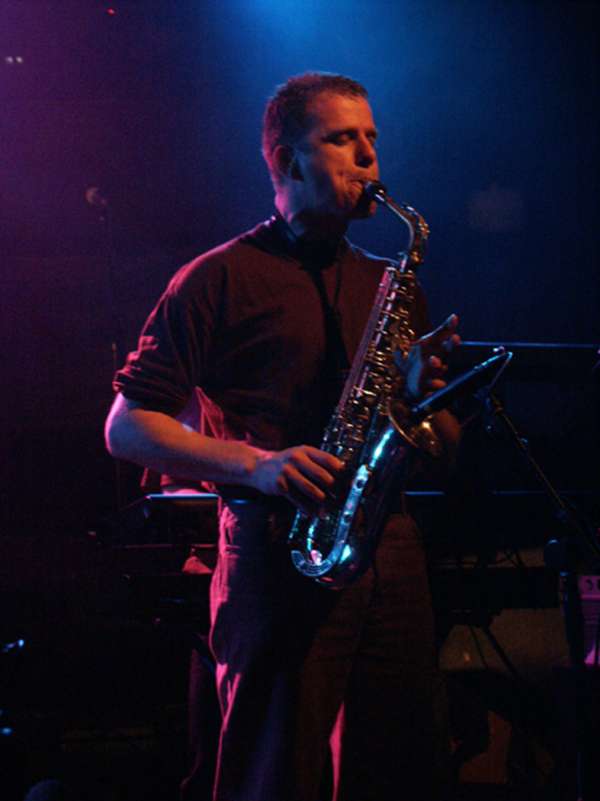
Photo By Chris Walkden
Saxophone
JH – What does Steve Simmons the Sax player on the first two albums normally
do?
Ian – Steve was a guest on the first two albums and he is a friend of the band
although he has never been a full member
Jonathan – Steve is basically a session player and a friend of ours. He plays with
a Jazz band and also does session work up in London. We wanted some saxophone
for "The Storm" so he came along and did that for us.
Rachel – He also played on the first album.
Jonathan – With the new album the way the writing went meant there wasn’t any need
for a saxophone part. It wasn’t done as a deliberate thing it was just that
as we were writing there were bits where we thought a flute might be nice for
and other bits where an acoustic guitar might be nice. This time however we
just didn’t write any music that we felt needed a sax part.
JH – So on the first album you just felt like you wanted a saxophone at that
point?
Ian – Yes.
JH – Paul’s guitar seems quite low in the mix on the 2nd
album.
Ian – It won’t on the third!
JH – Was that deliberate? Were you trying to keep the guitar more as a background
instrument?
Rachel – Oh god no. Not in the least.
Ian – I think with "The Storm" it was really down to the engineer
mixing it. We took it into Rockfield in Monmouthshire to mix and we went along
with the engineer’s suggestions. It was kind of his perceptions of the mix.
On the new album the guitar is very much upfront so it is quite a change in
the overall sound on the new album.
Jonathan – I think with "The Storm" the guitar solos are strong but
there isn’t an awful lot of rhythm or incidental guitar work. On the new album
there are a lot more rhythm and other guitar parts that are in with the sound
rather than just the solos, so I think that has made a big difference to the
overall sound.
JH – Apart from the DVD has Steve Simmons ever played live with you?
Rachel –
Yes he just did whichever gigs he could when he wasn’t busy. His session work
seems to be taking off and he has just done some stuff for John Lawton so it
is when he is free he sometimes comes along.
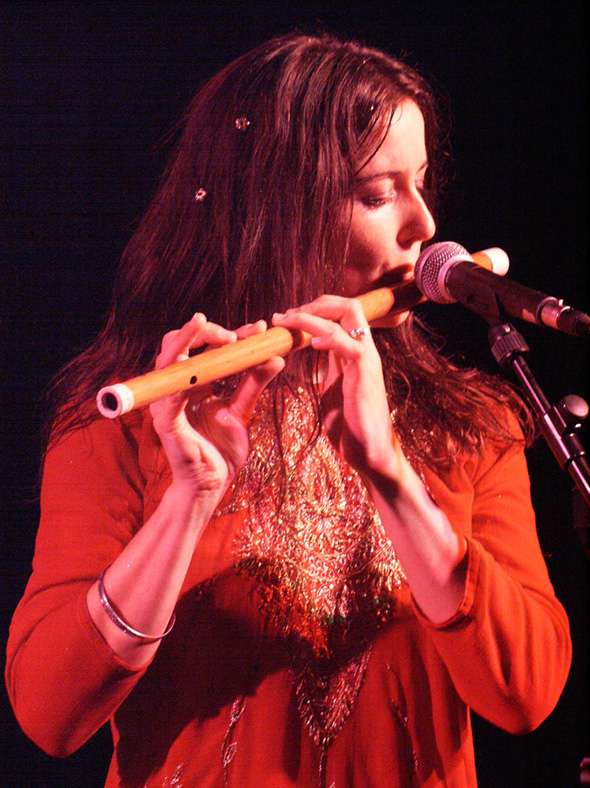
Photo By Chris Walkden
JH – So did you miss his Sax in the mix when you didn’t have him there?
Rachel – We just got used to the fact he was sometimes there and sometimes not.
If he was there, great. If he wasn’t there he just wasn’t. There was never a
stage when he was doing every single gig and we then felt there was a hole when
he couldn’t play.
Ian – I think Anne Marie has become far more integral as far as the live sound
is concerned. We have now got the extra vocal harmonies that we always felt
were missing in the live sound. Also Anne plays flute so she can fill in those
gaps too.
JH – So does she actually play where some of the Sax was?
Rachel – She hasn’t taken over anything that had a sax solo as such but having
said that we don’t really play anything live that had a structured sax solo
on it.
Ian – She has added in other areas.
Rachel – Exactly she has filled out the songs in different ways so that you don’t
think there is something missing.
JH – On the first album track "There Must Be A Way"
the sax part to my ears seems almost disjointed from the song. Do you have a
Jazz influence?
Ian – That is Steve’s influence really.
JH – But were you looking for that sort of thing as part of the arrangement?
Jonathan – I think the sax part on the particular song was totally improvised. Perhaps
that is why it sounds disjointed to you. It wasn’t a worked out arrangement.
Steve is a Jazz musician so we just asked him to improvise to it. It was an
experiment and I kind of like it but I can understand why you would say that.
JH – It’s not a criticism it is just interesting to hear
how it came about.
Jonathan – I think we had more or less written the song and Steve was coming along
to do some Sax parts on "Crazy". On the spur of the moment we just
got Steve to listen to "There Must Be A Way" and asked him if he fancied
playing some Sax over it. He played all this Sax over it and we thought,
"That sounds good."
Ian – It was quite funny I remember recording Steve doing it. Steve said, "OK
I will just play all over it and you just choose the bits you want". So
we listened back and we just decided we would leave it all there. The way we
recorded the first album was so funny because I didn’t have any practical studio
experience. I think sometimes people think of mixing as just twiddling a few
knobs here and there. Good engineering is a real art and I won’t pretend to
be a good engineer by any stretch of the imagination. I just remember I had
a go and did my best.
Rachel – I remember at the time though it didn’t matter because at the time I just
thought this is great we have got something we can listen to in 20 years and
we can play it on a hifi now. It never occurred to us that people would be writing
reviews of it.
JH – Have you started noticing people giving your songs
meaning that weren’t there when you wrote them?
Rachel –
Oh yes it happens all the time but that is quite nice though. It’s like we were
watching Travis being interviewed about "Why Does It Always Rain On Me?"
People were reading all these great emotional metaphors into it and he said,
"No I wrote it because it was raining outside and I had just been out and
I got wet!"
We had a drinks break at this point but as we were chatting curiosity kind
of got me interviewing again.
Miscellaneous
JH – Have you found since making your own recordings that
you are now getting more sensitive to the construction and recording techniques?
That you can’t listen to a good song because part of it is off key?
Ian – Now that we have finished recording I do listen to the mixes and stuff
and I go through this analytical stage listening to the mix and sometimes that
does get in the way of listening to the songs but that wears off and I can just
get carried away by the song again.
JH – So you haven’t lost your punter side then?
Ian – Oh no not at all. My musical tastes have changed but I am still just as
passionate.
Jonathan – I think this album has been recorded in a much more technically precise
way and I have occasionally found myself hearing things I wouldn’t have picked
up on before. I listened to "Trilogy" by Emerson Lake and Palmer the
other day and it came to a section and I thought, "Blimey that bass guitar
was slightly behind the drums". It does kind of spoil it a little bit when
you start unconsciously analysing the way sound fits together.
JH – Some people just can’t seem to switch off from analysing
music.
Ian – I do feel like that listening to our own stuff.
Rachel – You can’t switch off from it. It is impossible.
JH – Are you sick of the new album now it has got to the point where it has
got?
All – No
Jonathan – You would think after spending 8 months with the songs we would
be sick of hearing it but hearing the mastered stuff coming out last Friday
was like "Wow". I don’t want to sound too confident but if we didn’t
love it we wouldn’t do it.
JH – Do you go off your albums or song though?
Rachel – We don’t go off them. It becomes less of a challenge to play them. I find
we very rarely listen to our own stuff. We just don’t do it. We don’t tend to
sit down and think, "Oh I think I will play ‘The Storm’ now".
Jonathan – But we listen to the new album a lot.
Rachel – Yes it is very exciting listening to the new album.
Jonathan – I think there are one or two songs from the first album that make us think,
"We could write much better than that". After all it was six years
ago. So there are a couple of songs I don’t really listen to anymore and don’t
particularly want to play live. Of course we might be able to do something different
with them.
Rachel – We just kind of put them to one side in favour of new stuff, which is
more exciting for us.
JH – Is Immrama your own record label?
Ian – Yes
it was just the name we gave to our own cottage industry really. The Immrama
or the Immrama were I think traditional Celtic stories, which involved journeys,
and I thought this really fits what we are trying to do musically. I suppose
one thing we are trying to do when writing stuff is to take people on a journey.
That is certainly the way we would like people to receive the music. I don’t
want to make the obvious link with the song "The Journey" it is just
with every track I would like to feel I have taken somebody on a little adventure.
So basically it just seemed a nice word to use for the label name.
JH – Do you have a distribution deal for the label or do people have to buy
you off the Internet?
Ian – Yes we are distributed by Pinnacle in the UK by Voiceprint. We have various
other distributors in Japan and Europe. Laser’s Edge distribute us in the USA.
Marquee Incorporated in Japan. People can of course buy over the Internet too.
JH – So have you seen your CD’s in record shops then?
Ian – Yes, funnily enough we were in Tower Records in London at the weekend
and “The Storm” was in the racks there. It is available pretty much anywhere
even if you have to order it in.
JH – Where are your fans based mainly?
Jonathan – Up North!
Ian – Yes we have a really good following in the Rotherham area because of the
Classic Rock Society.
Jonathan – The Nottingham and Lincoln areas are very good to.
Ian – We also have good followings in Cardiff and Bristol.
JH – Do you get many international orders?
Ian – Yes lots from the States and Japan.
Jonathan – The most CD’s we have sold in bulk are to Japan.
Ian – We have done a lot through mail order specialists. GFT and Malcolm Parker
have done wonders for us.
Rachel –
ZNR in New Zealand do well too.
Ian – South America, all over really.
Rachel – Probably 1 in 4 orders are international ones.
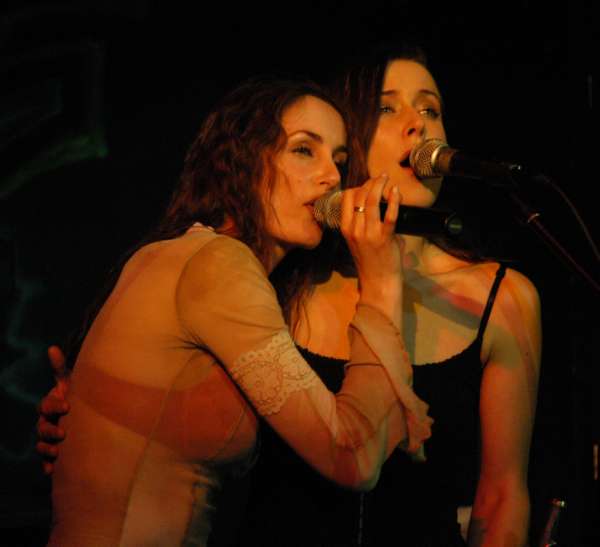
Photo By Chris Walkden
JH – What is the average age of your audience?
Jonathan – They are about the same age as us really.
JH – Is it very diverse though?
Rachel – It tends to be people in their 30’s and upwards. We get very few
teenagers.
Jonathan – Which is fine. I think people the same age as us, listening to us is good.
As my daughter says when I play our stuff "Well you are Ok but you are
not as good as Blue". How can you argue with that?
Ian – I think it is probably an audience that listens to the same stuff we listen
to. They can probably see where our influences come from and that is the kind
of music they like. I mean we have had people compare us to Camel. Again they
are one of my favourite bands and they are a band still doing really good stuff.
They are not an obvious comparison I suppose. But again it is that melodic approach.
Jonathan – I think in some ways we are like Supertramp or Wings. They were kind of
pop bands but also prog bands. They were very melodic but also had proggy leanings.
Ian – I think we also have a bit of Mike Oldfield as well. I didn’t mention
Mike Oldfield as an influence but I think he is in their somewhere.
The First Album
JH – When you put the first album out were you literally just running off
CD-R’s to start with?
Ian – Yes
JH – So when did you first get it pressed up as a proper CD?
Jonathan – After "The Storm"
Ian – Yes. People who bought "The Storm" then wanted to check out
the back catalogue. All one album that it was
Jonathan – It just became impossible to keep up with the demand on CD-R. I think
in the first year we sold over 1,200 copies of the Storm and to do that many
copies on a PC at home is just not possible.
Ian – It was also starting to look a little bit unprofessional in that it was
CD-r so we just decided to get it pressed up properly.
JH – How long did you spend recording the first album?
Ian – It wasn’t long at all. Probably only a month.
JH – And it was recorded at home so did you not have any
trouble with the neighbours? How were you doing the drums?
Ian – The Drums where recorded via a Midi Kit for the first album so they were
played but through a midi kit. That therefore kept the volume levels down. We
are actually quite lucky in that we have very understanding neighbours. We warn
them in advance if we are going to record something loud like the guitar. We
just did it bit by bit. A couple of hours here and there.
The Storm
JH – How long did you spend recording "The Storm"?
Ian – We started in August 1999 and we finished about November. Again that
was with big gaps. We weren’t recording every day. We did a few hours in the
evenings and at weekends.
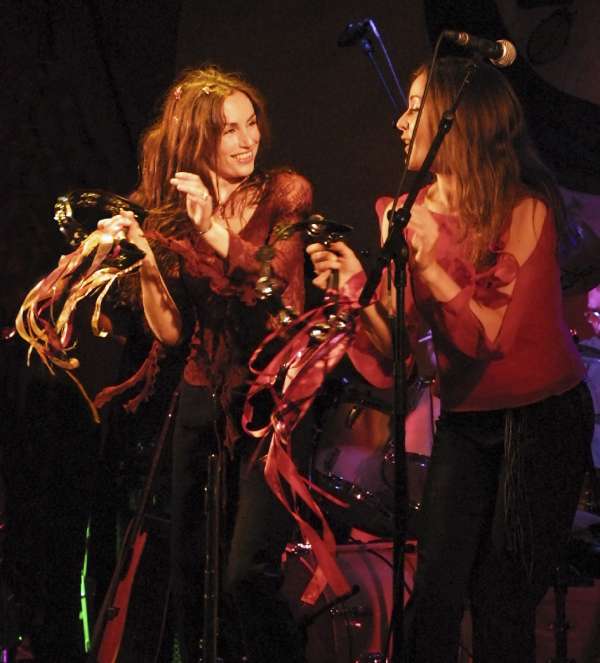
Photo by Stephen Mitchell
JH – How long would you spend on the Mix?
Ian – We spent 5 days in Rockfield. We did two songs a day, which was pushing
it a bit. Rockfield is a farmhouse in Monmouthshire and it has quite a nice
rock Heritage. Rush have recorded there and Queen did Bohemian Rhapsody there.
Marillion did an early album there and Clannad have done a lot of stuff there.
It’s got a really great history.
JH – Presumably that is the major expense in putting an album together?
Rachel – It was on the Storm.
Ian – This time every aspect has been a major expense of one sort or another.
JH – Is Mixing the last stage?
Ian – No there is then Mastering. We have just finished Mastering the album
down at Abbey Road.
JH – So where was the new album mixed?
Ian – It was mixed at Mighty Atom studios in Swansea. They are a company that
took over the BBC buildings, which were custom built recording studios. We used
an engineer called Joe Gibb who has worked with artists like Travis, Deep Forest,
Toploader, Catatonia and David Bowie. He is a real good guy in his field. It
was also the first time we had used a producer as well. We worked with Steve
Evans during the whole of the recording process. He works for Warner/Chappell
Music in Stockholm. We got to know him just as we finished "The Storm".
He said he would like to be involved next time we record. Luckily enough he
has got a very good studio himself so we had access to his studio and of course
his role as a producer.
Rachel – He has changed things a lot.
Ian – Yes, and it is good to work with somebody who isn’t part of the band
and fresh to the music. They have a different perception to an individual in
the band so they can look at the big picture. Plus of course we can tap into
his skills as a producer. He can look at the songs and tell us where the strength
of a song lies and draw out all those aspects.
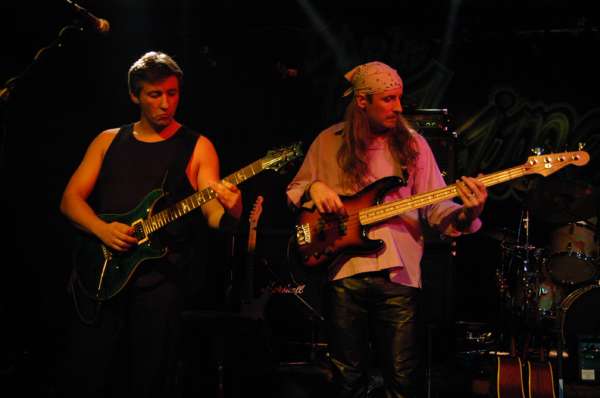
Photo By Chris Walkden
JH – Can you explain the difference between mixing and
mastering? I would have thought a good mix produced the end result for a CD.
Ian – Mastering is done when you have your finished mixes. You have everything
down to a stereo track. Master is basically just adding the final touches. You
add any EQ that needs doing. So you might find the final mix is slightly
Bass heavy or the vocals need bringing out a bit more. They run the song through
various processors, equalisers and enhancers.
Rachel – It is kind of like the Mr Sheen of Music. It adds that final polish to
it.
Ian – It is fine-tuning the final mix.
JH – Is that when tracks are compressed in order to make
the quiet sections louder and the louder sections quieter?
Ian – Yes,
but we haven’t really used compression much on the new album. We have gone for
a very open mix. We have kept all the dynamics from the recording and that is
something the producer wanted to do from the start. He didn’t want a heavily
compressed album. He wanted to retain the dynamics so that when it is quiet
it is quiet and if it gets big we make it big. When you use compression it basically
makes everything sound loud and often things recorded purely for radio are heavily
compressed. We didn’t use a lot of compression during recording or during mastering
either. We have kept it a very big and open sound. Mastering is literally that,
it is just a fine tweaking of the final mixes. It can make a very big difference
though.
JH – So when you finished "The Storm" did you
feel it was a much better album than the first album?
Ian – Yes we felt the song writing had moved on. The production had moved on
and we felt we had found our sound. In hindsight there are things we would have
changed. We felt the drums were a bit low in the mix. I think that is one thing
we ourselves would have changed. Compared to the live sound the album is a little
soft. When people saw us live people noticed quite a bit of difference between
the recorded side of the band and the live side. The new album has a lot bigger
sound. The leap in terms of production is probably bigger than the leap from
the first album to "The Storm". It is much closer to the dynamics
and the energy we have as a live band.
Rachel – It has captured the live sound where as "The Storm" just didn’t.
We often found that we would be sending "The Storm" off to venues
and they would say, "Well it is not very energetic is it?"
Ian – I think one thing we tried to do on "The Storm", was to create
a whole feel for the album. We recorded songs slightly differently to how we
might have done in order to get a more unified sound on the album. In hindsight
as I say we would have had the drums further up and pushed the guitar up a bit.
Jonathan – I don’t particularly like the fact that when you see some bands
live if you close your eyes you could be listening to the record. I like the
performance to be something different. So I kind of like the contrast between
live and studio. I think "The Storm" had its strengths and I like
the way people often heard "The Storm" and then came to see us live
and said "Wow that was different". I still think the new stuff live
is going to be different but the studio recordings have definitely got as much
power as a live performance .
JH – The fans seem to like "The Storm" a lot
more than the first album. Was it what you were expecting?
Jonathan – Yes it was better.
JH – So are you expecting it for the new album again?
Jonathan – Oh Yes.
Ian –
I think with "The Storm" by the time we were writing the songs we
were playing much more as a group. On the first album we were recording songs
that had already been written before the band as a unit formed. Whereas on "The
Storm" everyone had their own input rather than playing established parts.
So overall I think "The Storm" was more cohesive. By that point we
kind of knew where we were taking the band in terms of the way we wanted to
sound. I think it feels more like an album and it feels more complete. I also
think we were just writing better stuff and that progress has continued through
to this one.
Jonathan – When we started doing the new one we felt if we can’t do better than
"The Storm" then there is no point in recording. We have got to get
better.
JH – You said you are writing music for yourselves didn’t
you? Are you still trying to do that or are you now trying to write to an audience?
Rachel – No we are still writing for ourselves.
Jonathan – If you play together for 6 years and you are not getting better
there is something wrong. We make more demands on ourselves. One thing that
is difficult when you play in one band only is that everybody knows everybody’s
level and you play to that level. So it is very easy to get into a position
where it is all very cosy and you don’t stretch. We have tried to not fall into
that trap. We have tried to push things all the time so that we can go beyond
what we could do before. If I was playing the same stuff I was doing two years
ago I think I would get bored.
Supporting Tours
JH – It says on the Bio on your web site you played support
to Porcupine Tree. How did that come about?
Ian – That was through a connection with a Belgian promoter. We sent a promo
package off because we were looking for some gigs on the Continent. They got
back to us saying they really liked it and offered us some gigs in Holland and
Belgium. Initially it was just going to be us doing some gigs on our own and
then a few weeks later they asked if we were interested in doing some gigs with
Porcupine Tree instead.
Rachel – We said, "What sort of question is that? Of course we were".
Ian – It was just a kind of luck really. We happened to send stuff off at a
time when Porcupine tree were out touring. We did 3 gigs with them and a couple
by ourselves. Playing to a different audience was a great experience. The audiences
on the continent seemed open to all sorts of music and Porcupine Tree were a
great band to work with. They were really interested in what we were doing.
Rachel – I think every gig we did with them they came to watch our set.
They were very friendly and very supportive.
Ian – It was just a great experience for the band all round.
JH – Did you enjoy the touring?
Rachel – That was great. We had a fantastic time.
Ian – We
are looking forward to going back.
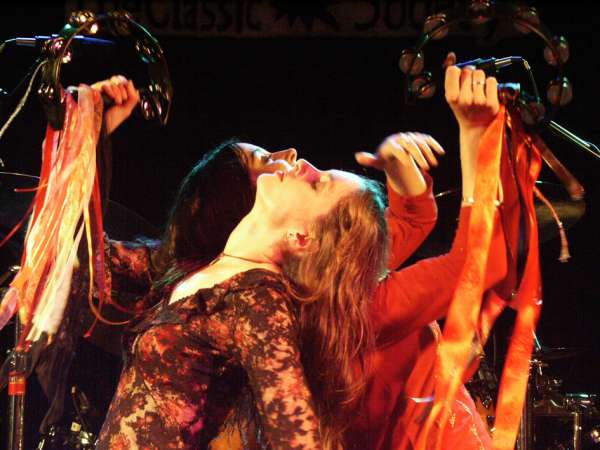
Photo By Chris Walkden
Promotion
JH – You put the "Heaven Can Wait" track on a
Classic Rock Magazine CD sampler. When I researched it the costs seemed prohibitive
for new bands starting out. Do you feel it paid for itself?
Ian – Oh yes definitely. We have had a lot of people coming along to gigs just
on the strength of hearing that track. Even now probably two years later we
still get people coming up to us who first heard of the band through the cover
CD.
Jonathan – What was nice as well was that "Heaven Can Wait" was so different
to all the other stuff on the CD. The others tracks were heavier rock so it
did kind of stand out.
JH – Do you tend to get much promotion?
Jonathan – I guess for a band at our level promotion is a difficult thing because
it costs so much money. You can get the gigs, you can be pushy and make lots
of phone calls and the Web site really helps. You can even get played on the
radio but other promotion is really hard.
JH – So you manage to get played on the Radio?
Jonathan – Well a lot of it is just down to just having the cheek to ask. We
know a lot of other bands around Swansea and elsewhere that perhaps haven’t
got the nerve to ring up some places and ask. We thought "Shall we send
stuff to Bob Harris on BBC Radio 2" and we decided it would only cost us
a CD and the worst that could happen is that he doesn’t play it and it goes
in the bin. But he actually played four tracks on four different Saturday shows.
And that was just through us thinking that there was nothing to lose so lets
send it off. It helped raise the amount of interest generated in the band. It
also helped us to get better gigs. Whereas people would previously say "Karnataka?
We have never heard of you" now they might say "Oh weren’t you on
Bob Harris?" and they give us a gig. It’s advertising that we find impossible.
We rang up Mojo. "How much is it for a 1/4 page advert?" "£1800".
If you haven’t got a record company behind you to do that you just can’t do
it.
JH – That’s what scared me with the cost of the Classic
Rock track placement. I thought, "How on earth do new bands get the publics
attention? It is such a risk"
Jonathan – We did advertise in Classic rock and Wondrous Stories and we spent hell
of a lot of money on it but really it is just prohibitively expensive to promote
which is why bands need word of mouth and the Internet. It is the best kind
of promotion you can get if you are not a multi-millionaire. The web site still
amazes me even now. Especially when we get messages from Brazil, Holland and
Vermont. Because we did a support slot with All About Eve we are now getting
their fans writing in and saying we saw you on the All About Eve Website. It’s
great the way it works.
JH – What was that slot then?
Jonathan – We supported them in a packed Pavilion in Swansea recently on their tour.
That was a great gig they were good and we really enjoyed it and doing just
that one gig has generated a lot of interest among their fans.
JH – Have the local radio stations in Wales been good to you?
Rachel – Radio Wales has been very good.
Ian – They have been very supportive. They featured "The Storm" as
album of the week. They played a track every night for a week. They invited
us in to do an interview and they have invited us back in since to do another
interview.
JH – Is that just a local station or the BBC?
Jonathan – It was BBC Wales in Cardiff and they broadcast to the whole of Wales.
Ian – Radio Caroline have been very supportive. As have Total Rock radio. Especially
Malcolm Dome.
JH – Are you actively trying to get on Festival gigs?
Ian – To be honest we haven’t done that much. I think for that sort of thing
you need promoters and the right contacts. The Canterbury festival came about
through a promoter that does gigs for us up in the North West. We have just
found out the last year that provided you have a good live reputation, word
of mouth that gets you on Bills. We haven’t sent much stuff off. Once we get
the new album pressed up that will be the next stage.
JH – I have noticed the more successful you are as a band
the less you seem to get paid to perform at these festivals. Sometimes you get
expenses. Sometimes not even that.
Ian – Yes
some bands that get support slots do so because they are actually paying to
get on the Bill. We have never done anything like that but that is quite common
practice
JH – Do you pay for yourselves to travel to gigs so that you can get this
sort of exposure?
Ian –
Oh yes.
JH – I have noticed there is an excellent little festival
in the tiny town of Halesworth, Suffolk. Is that the sort of gig you would go
to?
Ian – Yes. We are prepared to travel anyway. We have just confirmed a gig in
Glasgow for August. So the travelling never puts us off. If a chance for us
to play live comes along we tend to view it as a great opportunity to reach
a new audience.
Jonathan – We will play anywhere we haven’t performed before if it is a suitable
type of venue. We look at the overall picture when doing gigs. There are some
gigs we will make a loss at but then overall the band doesn’t make a loss on
the gigs it does. We are willing to do a gig at a loss if we think we will reach
a new audience.
Ian – We are doing a festival in Monmouth at the end of July and there are some
top names and lots of little local bands. It is a right mixture. There are some
interesting festivals out there.
Music Scene
JH – OK now for an obscure question. I was discussing you
at a Mostly Autumn gig and some people reckoned you were heavier but I and others
reckon you are a lot softer. How would you view it?
Jonathan – I think we are a totally different band. The line-ups are fairly similar
on paper but the music is nothing like them.
JH – I agree, the guitars in particular are completely
different.
Ian – I think Paul’s style and influences are very different to the rest of
us. He is into Joe Satriani and Steve Vai.
Jonathan – Yes he is also into Bon Jovi and Van Halen. That kind of stuff.
Ian – And they probably aren’t typical influence for the sort of music we are
doing.
Rachel – That’s what makes it interesting.
Jonathan – I think Mostly Autumn based on their press releases and website are happy
to state they have a strong 70’s influence. They aren’t backwards about saying
this either. They view the 70’s as a golden era and they are kind of recreating
that 70’s vibe. I think that is great but it’s not something we as a band are
interested in doing – we don’t want to recreate the 70’s. We want to create
something new . Of course we do have elements of the 70’s in our music, but
it’s just on element among many others.
JH – Well this will obviously be an insult to you but to
me you’re more of an 80’s band. You are similar to Marillion to a certain extent.
The keyboard use in particular. But Paul’s guitar style contains that non-musical
Steve Via style as well as the clean Steve Rothery.
Jonathan – It is not the first time people have said we are kind of like Marillion
and I find it odd.
JH – Well in the same breath I would say you are nothing like Marillion too!
Jonathan – I have never actually owned a Marillion album. I think once I borrowed
“A Script For A Jesters Tear” and didn’t like it.
JH – But back then they were Genesis based and they are
an influence of yours so I guess that would lead to similarities.
Ian – Yes
I suspect both bands have similar influences and that is likely to come through
and I can see where people make the comparisons. I think Steve Rothery’s lead
style is very melodic and I think Paul’s style is very melodic. Perhaps the
first two Hogarth era album’s "Season’s End" and "Holiday In
Eden" were very strong melodically and are two of my favourite Marillion
album’s so I can kind of see comparisons there. I think when people hear what
we have done on the new album they will find it a lot more contemporary. It
still has all the elements of Karnataka in terms of how people perceive our
sound but it is different. We have taken it all one stage further.
JH – I feel I should justify my comment a bit. In my collection
there is nothing from the 90’s so in your genre the 80’s is about as modern
as you can be.
Rachel – Mmm (not quite agreeing) I just don’t think we are like anything else.
Ian – No, it’s an interesting point. The 90’s were an interesting decade musically
because it is difficult to pin down styles like you could in the 70’s or 80’s.
JH – There is nothing in the field you are in that is new
to the 90’s or 2000’s is there? Perhaps there are bands I never got into.
Jonathan – Some of the bands that I was into in the 80’s and the 90’s aren’t anything
like how I play. My favourite band of the 80’s is the Smith’s and we don’t sound
anything like the Smith’s. But then again the Smith’s were very melodic and
very good at interweaving different lines and also had some great string arrangements
– so there are points of contact. But there are also 90s bands such as Porcupine
Tree who are more obviously in the same general musical area as us.
JH – I have noticed if I listen to what my favourite artists
are into it is nothing like what I would expect. I assume that is how they keep
fresh in their area. They bring lots of parts of other disciplines in and mix
up the pot to get something new and original.
Jonathan – We
have often said if we had 6 members in the band who were all fanatical Yes fans
and listened only to Yes then our band would just sound like a 2nd hand Yes.
So it is kind of interesting that we have all got different influences and we
don’t really play the kind of stuff we listen to – it all gets filtered into
the Karnataka sound – the diversity is what makes it interesting..
DVD appearances
JH – How did Rachel come to be doing the backing vocals
on the Mostly Autumn DVD and Live album?
Rachel – That came from doing a joint headline gig with them for the Classic Rock
Society in Rotherham. We got on well with them at the gig and they were looking
for a backing vocal team for the DVD so they rang me up and asked if I wanted
to do it.
JH – So you met at that because of the Classic Rock Society.
Rachel – Yes. We had actually met them before at a Classic Rock Society awards
night and had a chat but Martin had put the gig together and we got together
on the night and had a chat etc.
JH – Did you enjoy doing the backing vocals for that?
Rachel – Yes it was great. It was just really nice to do something different. I
really enjoyed singing as part of a team as well. They were really nice people
to work with and it was a good laugh and a really good fun day.
JH – How did the recording of your DVD come about?
Ian – It started at the Mostly Autumn filming session. We were introduced to
Bob Carruthers and we just got chatting. He had heard of the band and he asked
for a copy of "The Storm". We gave him one and literally a week or
so after the gig we had an E-mail from them saying they would really like to
do something with the band. And within a week of that they said "We have
got a date available at the Mean Fiddler we would love to do a DVD are you interested?”
It was as quick and straightforward as that.
JH – Why isn’t there a live CD for the gig?
Rachel – It wasn’t really our decision.
Jonathan – Classic Rock Productions have control over it and it was their decision
what to put out. They decided they only wanted a DVD. There is no VHS of it
either which was slightly disappointing for us, as a lot of people have asked
for a video copy of it. But again that isn’t in our control
Ian – I think it is just down to the economics of it all. I think it is a lot
more expensive to produce VHS copies and most people seem to be moving over
to DVD now anyway.
Jonathan – At the moment we are thinking our next album next year may be a live album.
JH – What did you do in preparation for the DVD?
Rachel – Lots and lots of rehearsals! We also drafted in some extra singers.
Ian – They included Anne Marie who has since become part of the band. So it
was just a case of deciding the set list and order.
Jonathan – It was a shame in a way that our three singers were from all over the
place so the logistics of getting the whole band plus singers together to rehearse
was a bit of a nightmare.
Rachel –
I think we did a few long days rather than lots of short sessions.
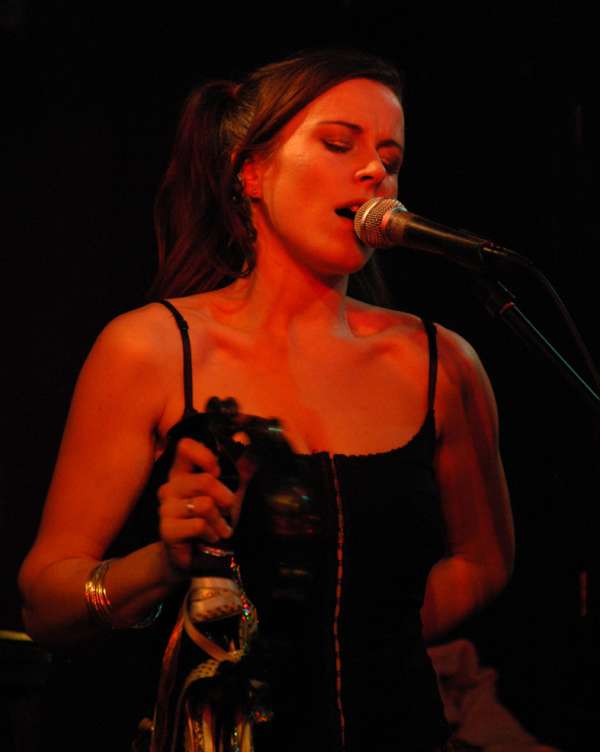
Photo By Chris Walkden
JH – Did Classic Rock Productions send out cameramen to do practise gigs as
well?
Ian – Yes they filmed us in the Limelight in Crewe and at Rotherham Rocks.
Rachel – I think that is where a lot of the back stage stuff was filmed actually.
Ian – Yes they were filming us back stage and they were filming the gigs. They
also sent us up to Scotland to do some promo footage, which was then incorporated
into the live footage.
JH – I had a discussion with a Cameraman or the vision mixer and he felt
you might be a tricky band to film because you don’t move a lot when performing.
He was apparently trying to encourage you to move around a bit more. (Having
seen the band since this interview I should point out this is no longer the
case. The band development live over the last year has been amazing!)
Ian – I think that is something that was happening naturally anyway.
Jonathan – I think
as well at that particular gig we were all tense. I think now that Anne is in
the band as well that visually there is a lot more movement. The interaction
between her and Rachel is very visual and their personalities just shine on
stage. Also their voices are so different yet complement each other so well
Now that the live sound is just so good the confidence just allows the band
to enjoy the moment and really go for it on stage
Ian – I think
now that we have a lot more of the bigger gigs under our belt and our confidence
has grown and our gig presentation has started to improve and will continue
to do so.
JH – Are you starting to think more of stagecraft and presentation?
Jonathan – You have got to. People are watching as well as listening so we have to
think about that.
Ian – I would like to see us being able to do more with the lighting because
I think better lighting would just complement the music. So yes we are now thinking
in terms of what we can do with stage production and how we present ourselves
visually. But it gets easier with the more experience you get.
JH – I think the DVD was the first time I had seen you
so it was interesting to me to see that the most movement was when Steve came
on. He obviously had time when he wasn’t playing anything in his songs so he
had more time to muck about but he also was moving around the band members and
interacting. It seemed good for Rachel to have someone to work off.
Ian – There is a lot more of that going on with what we are doing now. We have
had a lot of people commenting that the DVD is great but they were surprised
at how much the band has moved on since then.
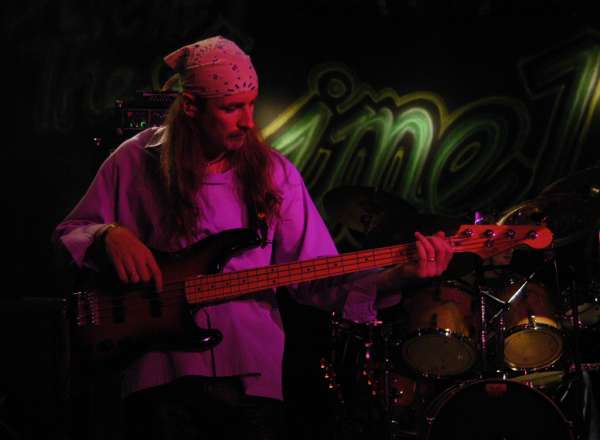
Photo By Chris Walkden
JH – When I saw you the next time at the Mean Fiddler in
January the presentation had improved a lot.
Ian – And it has improved a lot since then too.
Rachel – I have to say in retrospect looking back at the DVD the reason we didn’t
move around a lot on stage was because we were petrified. I am normally a lot
more mobile than that on stage. I always have been. One factor was I wasn’t
allowed to use my Radio mic because that would cause problems with the sound
when recording. We had to be very careful not to get any feedback so that made
us really scared to move too. It is rather frustrating now when we look back
at it as we think, "We could have been so much more."
Ian – There was a lot of pressure to get it all right because there was only
one gig to do it. It’s not like we had two or three gigs to pick the best performances
from. Everything hinged on one performance.
Jonathan – I think it was a good representation of us at the time though. 9 months
has gone since then and our stagecraft is much better.
JH – And you are thinking about it more?
Jonathan – Yes. I think the DVD project helped focus us on that aspect a lot more
because we were then able to see what we looked like on stage. We had never
seen ourselves. People tell you but it isn’t the same thing as seeing it for
yourself.
JH – Rachel did you feel natural on stage or were you vamping it more?
Rachel – I was probably doing it less than normal because I felt so restricted
in what I could do.
JH – You seemed to be really using your eyes a lot.
Rachel – I think I do that anyway. That is generally part of my stage thing anyway.
I like that if I go to see a gig. It is the point where an artist is making
contact with part of the audience. It is the personal connection thing.
JH – And you sounded like you were feeling what you
were singing.
Rachel – Oh yes. I always do.
JH – I couldn’t tell if you were trying to act it or if
that was just the natural you.
Rachel – That was probably understated compared to what I would normally do.
JH – How did you feel about Bob from Classic Rock Legends
getting up on stage and thanking you at the DVD screening?
Ian – I think that was really nice. He didn’t have to get up and make a little
speech but he is obviously so into what the bands are doing.
JH – It seems a bit like an expensive hobby for him and
I think it is great that he is doing it.
Ian – I think it is amazing because there are so few outlets for music of this
sort.
JH – So were you pleased on the night of the gig and did you have any problems?
Rachel – No we didn’t. I just remember feeling very conscious of the recording.
Obviously every gig you want everything to be perfect anyway but we particularly
needed it to be correct for that one. It just made everyone slightly more inhibited
than we would feel normally. I had lost my voice the week before and hadn’t
been able to speak! We did Rotherham Rocks the Saturday before and as soon as
we went home on the Sunday I got a sore throat and my voice just went and I
couldn’t even talk until about a day before the filming. I was really, really
scared. I didn’t even know if I was going to last the sound check.
Jonathan – If anything we are hyper critical of our performance.
Ian – I was very pleasantly surprised watching it back. I know how I felt on
the night and I don’t think I looked too nervous. We don’t look as scared as
we were.
JH – I believe you were sent a copy of the DVD before the
screening but you didn’t comment on it for a few days? The Classic Rock Legends
were worried you didn’t like it.
Ian – I don’t think we got chance to watch it for a few days. Our lives have
been so wrapped up in the studio for the new album that lots of things just
had to be put on one side. We don’t have a manager and we deal with everything
ourselves so we have to prioritise our time.
Jonathan – I think another factor was the apprehension of watching it. I remember
when I received a copy of it I put it in the DVD player and started thinking
"Oh I will put the kettle on first". Then I got back to the lounge
and thought "Oh well there is no point is watching it until I have made
my coffee". Then when I made the coffee and decided to go and get a biscuit!
Ian – I don’t think anybody wanted to be the first person to watch it.
JH – Yes that is why it was a shame the screening for your
DVD got delayed. I am sure it would have been great for you all to sit down
and watch it the first time together.
Ian – Yes but we were so pleased to see it at the launch as well.
Rachel – It was nice to see it on a big screen.
JH – Did you bring a coach of friends down from Wales?
Jonathan – We didn’t have time to arrange anything because we were still in the mixing
stage of the new album.
Ian – We were given a set number of people for the guest list and we filled
that. People came from all over the country because I asked if anyone wanted
to go on our Mailing list.
JH – Are you disappointed there is no live CD?
Ian – No not really. We have never even discussed it with them. I don’t know
if there might be the option of them doing one anyway. But even before we did
the DVD we planned to do this album and then follow it by a live album.
Jonathan – I guess if we made a live album ourselves we would take the equipment
to a number of gigs and record 7 or 8 gigs and then pick the best bits from
each. Whereas this was just one performance It would be nice to have control
to reduce the pressure and get the best results.
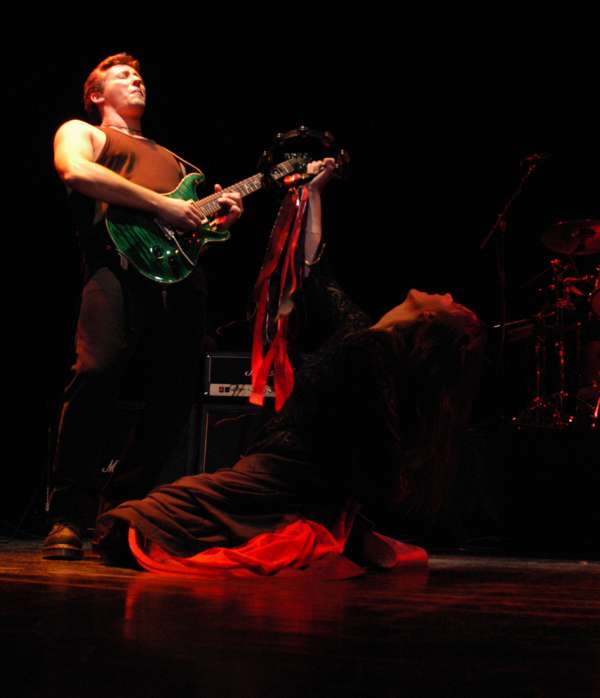
JH – Did you enjoy the DVD when you finally forced yourselves to watch it?
Rachel – Oh yes enormously.
Jonathan – Our perception of the gig at the time was "Oh we could have done
that better". However when we saw the DVD we thought "Oh we were pretty
damn good!”
JH – Did you have to do any overdubs for it?
Rachel – No we didn’t do a single one. It is exactly as it happened.
Jonathan – There again there was no time to do it really.
JH – Where was the outdoor bit on the DVD shot?
Rachel – In Kelso in Scotland. It was the Duke Of Roxburgh Floors Castle Estate
in Kelso. And it was absolutely freezing! We shot it in February.
JH – How did you feel about doing it?
Rachel – It was a great laugh. It was really excellent.
JH – Presumably they played the sound of the DVD for you to mime to?
Rachel – Yes
JH – Why was it just Ian and Rachel and not the rest of the band as well?
Ian – They just wanted a couple of us to sync in bits.
JH – Was that a special trip then?
Ian – Yes it was three days in total. A couple of days travelling and a day
filming on the estate. We had to travel so far because the record company have
connections on the estate. They have filmed there before and if you film anywhere
you have to have filming permission from the landowners.
JH – Did you like watching these sections on the DVD? Were
those clips designed for potential video release?
Rachel – I don’t like watching myself on film so I found it a bit odd. It
was the company’s idea. They decided what they wanted to do and we did it. I
don’t think we would have thought of doing something like that. We would probably
have just left the concert Livefootage from end to end. The clips work though.
Ian – Yes the balance is there.
The Delicate Flame Of Desire
JH – Lets move onto the new album. From what you are saying
you are pleased with the way the recording for the new album has gone?
Jonathan – Yes we are very pleased.
Rachel – It has been an extremely different and exciting project really. Not
to mention very hard work.
Ian – As I was saying earlier it’s the first time we have worked with a producer.
We have taken stuff in different directions. Rather than basically recording
just live versions of the songs we have taken a step back and changed songs
as we have gone along. It has given them a new life.
Jonathan – And again it is a kind of cliché but we have used the recording process
as a creative process this time. We have used the studio as an instrument. We
haven’t really thought "Oh dear we have got to play this live later so
we can’t do this". We have just really experimented with the arrangements
and the way things sound and yes we now have a problem of how we are going to
play the songs live. We chose to go this way though rather than limit ourselves
straight off.
Ian – It
is more of a challenge doing it this way. We just let our imaginations go as
we were recording and now the challenge is to reproduce it live. Again we have
never been too worried about the recording side of the band being one thing
and the live side another. I think most people when they go to a gig don’t want
to hear a perfect reproduction of a studio album. They want to see a different
side to the band. That is what excites me when I go to see a band. I want to
see different elements and I want to see the songs done in a different way.
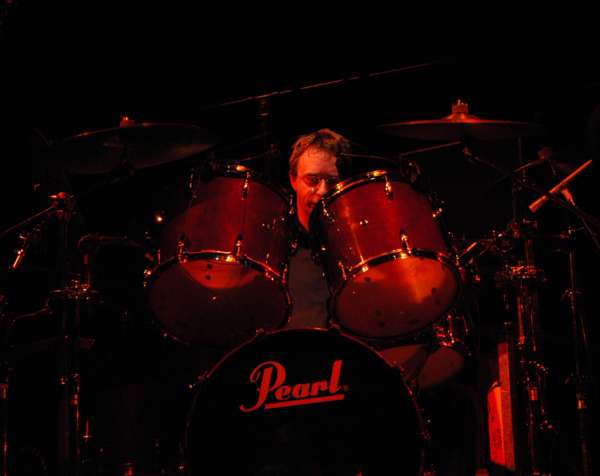
Photo By Chris Walkden
JH – Does the album have a different feel to "The Storm"?
Rachel – Oh yes it is very, very different.
JH – And is it the direction you want to go in?
Jonathan – Yes. "The Storm" had a more folky element to it. That was good
and that was what we wanted to do at the time but I think this album is a lot
more powerful.
Ian – It has got balls. It’s more dynamic.
Jonathan – But it’s still got some celtic elements in the mix
Rachel – It’s just a lot more 3 dimensional than we have done before. It explores
lots of different angles to the band and has a new twist to it. I am really
pleased with it.
Jonathan – I know it is blowing our own trumpets but having been listening to the
stuff for so long it’s just like the songs start when the should, change when
they should and end when they should. The guitar solos feel like all the right
notes are there. You couldn’t change them the songs just feel right.
Ian – I think
the songs all evolved in a very organic way. There is very little repetition.
There is nothing that we would call filler. I suppose we are quite hard on ourselves
when we write. We have written complete songs that we decided weren’t good enough
to go on the album. So what we actually recorded …
Rachel – … was the best of what we could do.
JH – Do you tend to write more songs than you need and
record more songs than go on the album?
Ian – Not on this one no.
Jonathan – Basically apart from knowing the songs we wanted to do, economically it
costs so much to do that we can’t afford to record ten songs and release eight.
So we have to decide as we go into recording what is the best music we have
got.
JH – But do you get to the demo stage and then think "No we won’t bother
with this one"?
Jonathan – We have kind of done that because we have got up to a certain level with
some songs and then we think "No this doesn’t fit." Some stuff we
do is quite good but it just doesn’t fit with the rest of the stuff in terms
of the album as a whole..
JH – Did you sit down before you started writing the album
and think "Right we want to go in this direction this time" or did
the album just come out and go in it’s own direction.
Ian – It just goes in it’s own direction. You surprise yourselves sometimes
with the way a song turns out. There is certainly one song on the album, which
is very different to anything we have done. I think it would be difficult for
us to force it. I just don’t think we would manage it.
Jonathan – It’s not a rule but one thing we have tended to do when writing is if
anybody says "Oh that sounds like such and such…" Then we say "Ok
Stop. Lets do something else".
Ian – We were lucky to get the radio play with Bob Harris so perhaps people
will think we will write shorter songs in future but if anything the songs on
this album are much longer. There are a couple of songs around the 10min mark
and quite a few songs over 7 min. It’s not "The Storm 2" and it’s
not an album that has been written for radio. Having said that there are perhaps
3 or 4 songs that would be strong candidates for radio play. Even when the producer
has suggested we might want to cut a bit out we have stuck to our guns. It is
very much the album that we wanted to make. We write for ourselves and if other
people like it that is great. We hope others like it but it has never influenced
our writing.
Jonathan – It is kind of nice that at this level we can do what we want. There is
no pressure to write to any formula so we please ourselves.
JH – Now that Anne is officially part of the band is she backing Rachel on
every track?
Jonathan – She is not actually on every track as she joined halfway through
the recording of the album, but she is now a permanent member of the touring
and recording band from now on.
JH – Is that opening up new arrangement for you on
backing vocals or did you just multi-track yourself before?
Rachel – Well previously I did all the Harmonies and stuff on "The Storm"
so it was really nice to have an extra voice on this one. It just brings a whole
new feel.
JH – You played me "After The Rain" as we travelled
and she was singing quite varied parts not just straight harmonies.
Rachel – There are lots of things. Lots of ad libbed stuff on the end of that
as well.
Set Selection
JH – When you are playing live do you have a fixed set
list or do you vary it according to the crowd?
Jonathan – It depends.
Ian – I don’t think we vary it for the crowd. If it is a joint gig with somebody
and a shorter set is required, we will perhaps select shorter punchier songs.
Jonathan – I think choosing set lists is like deciding the track listing an album.
You want the set to have a dynamic and you want it to flow so we try and think
about how the set is going to sound overall. But yes sometimes when we play
a gig it can vary. When we play locally we don’t tend to have a set list at
all. We just have fun.
Ian – There is no set, set list for every gig. We do pair songs up sometimes
because we like that combination and the last two or three gigs we have started
with the same two or three songs because we feel these are strong openers. Pretty
much every gig we sit down and think "What do we want to do and in what
order?”
JH – At the DVD shooting you have the Intro and the Outro sections. Is this
done every time?
Rachel – No apart from Rotherham the week before that was the first time we had
done it.
Jonathan – We just thought it would be a nice kind of intro to the band. And I thought
it worked well on the DVD.
Ian – It’s an idea as well that we have incorporated into the album. It has
been completely reworked but that is kind of the start of the album and it is
part of a longer piece. It is going to be two tracks on the album. But really
it works with "Time Stands Still" which is the track we have opened
most gigs with recently. But we have only used it live twice.
Jonathan – I think
we are likely to use it as a live opener again.

Rachel
JH – We now move to individual questions. Why did you choose your instruments?
Rachel – I was born with mine!
JH – So why did you choose to use it?
Rachel – I have just always loved singing. I have always liked choir things and
music hall stuff when I was at school. I have always loved singing and
I don’t think I could do anything else. It is just who I am and what I
do. It’s my form of self-expression.
JH – Have you got any influences that you would like to sing like?
Rachel – No. Harmonising has always been my big thing. When I sang I was always
making up harmonies as opposed to singing in any particular style. One thing
that I have always been conscious of that really annoys me is when you get a
British singer in full flow and they sound American. I really want to retain
a personal style. I don’t want to sound like anything or anybody in particular.
JH – So there were never females singers you wanted to emulate when you were
growing up?
Rachel – No I just used to listen to lots and lots of different stuff. I was a
big fan of Kate Bush but I don’t sound like her and I don’t want to. There are
just all sorts of different voices and I have always been fascinated by female
voices.
JH – When did you first start singing?
Rachel – I can’t remember a time when I didn’t sing. I always did as a kid. All
of the time. I used to sing in and out of the house and at school. I sang at
the youth club too. I did all sorts of stuff. It is just something I have always
wanted to do.
JH – So you have always sung in bands then?
Rachel – Yes, I have been in the various configurations of the pre-Karnataka
bands since I was 17 anyway. It was just mainly school things before that.
JH – So you haven’t been in any bands before then?
Rachel – No. It has just been in different personal line-ups of this trio’s pre-Karnataka
bands. We actually used to go out as a 3 piece many moons ago.
Jonathan – I think there is a song on the first album "Run To You" which
we first played 12 or 13 years ago as a three piece with a four-track recorder
and a drum machine synced up. It was just bass keyboard and vocals. So it has
always been in there.
Rachel –
We just went through lots of line-ups and combinations before settling into
being Karnataka.
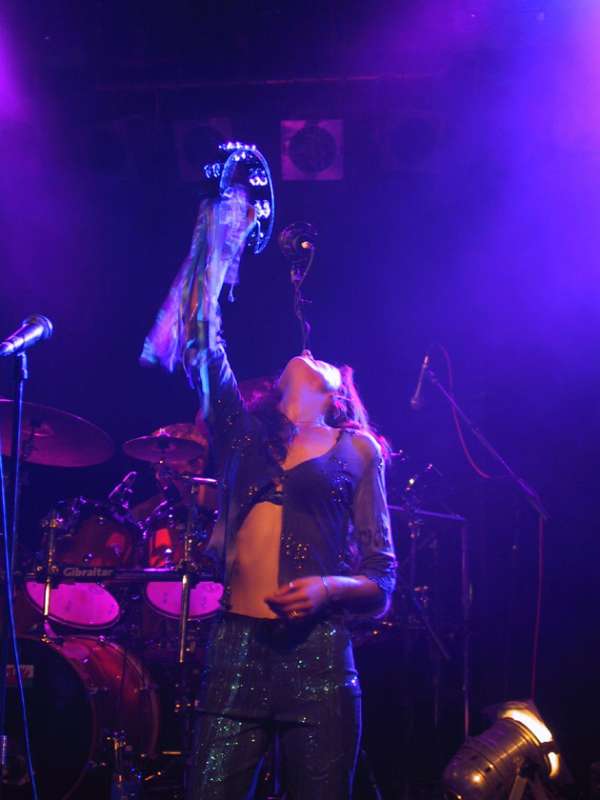
Photo By Chris Walkden
JH – So how did you three come to meet?
Ian – Jon
and I were introduced through a mutual friend. We had both played in bands with
this friend but never the same band at the same time. I think Jon and I had
the same attitude that we just wanted to do our own thing rather than doing
cover bands. So our mutual friend suggested we get together as we seemed to
have the same ideas and direction. So we just started working on some instrumental
ideas and …
Jonathan – … Neither of us could sing!
Ian – So the next step was that we needed a singer. Jon was working with Rachel’s
mum at the time.
Rachel – Yes so it was my mum’s fault!
Jonathan – So I just happened to mention to Sue that we were looking for a singer
and she said, "Oh my daughter sings perhaps she would be interested".
So we did a tape of a song we had written together. We had in mind this verse
chorus verse chorus and it seemed obvious from the chords that this was the
structure. So we gave it to Rachel’s mum and Rachel came back with this tape
and we listened to the results. There was no singing until halfway through the
verse. Her verse vocal then carried on into the chorus. Towards the end of the
chorus Rachel sang some chorus lines. We thought, "This is wacky but it
is really good." and we decided Rachel was the one for us. So she
was the only singer we ever did audition. It just worked straight off. She had
that same quirky weird.…
Rachel – That’s Me!
Jonathan – …
sense of how things fit together as we did. So that is how it all started.
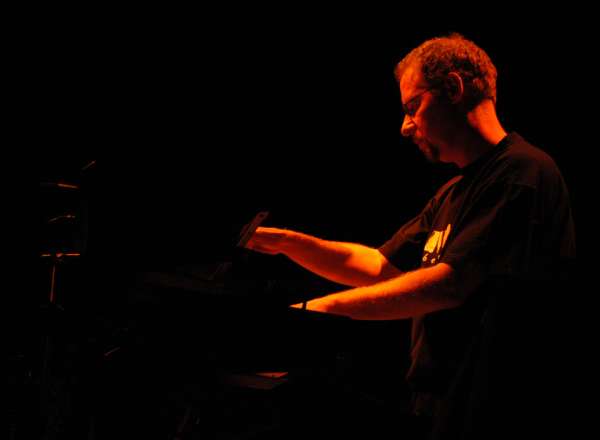
Photo By Chris Walkden
Jonathan
JH – So what made you choose keyboards?
Jonathan – Well I was forced to have Piano lessons from about the age of 8. I gave
them up at about 12 as I didn’t like classical music at the time. But I can
then remember hearing David Essex "I’m Gonna Make You A Star" and
thinking I really liked the sound at the end which was a moog . Then my brother
had a tape with "Trilogy" on it so I got into Emerson Lake and Palmer.
I think listening to Keith Emerson really made me want to play keyboards. It’s
the same with Rick Wakeman as well. It’s that kind of prog styling that made
me want to be a keyboard player. So although I stopped lessons I just carried
on playing as I listened to records.
JH – Compared to most bands you have quiet a big roll in
the band, don’t you? A lot of bands seem to treat the keyboard player as a technician.
Jonathan – Yes one thing I really enjoying is arranging. I think I am more
of a kind of chord and arranging type of person. I know that solos aren’t my
big strength so I don’t tend to play a lot of them. I play the occasional solo
but normally it tends to be more chords and backgrounds that I play live. And
that is why it is such a big part. I kind of lay the stuff down and Paul plays
over the top of it.
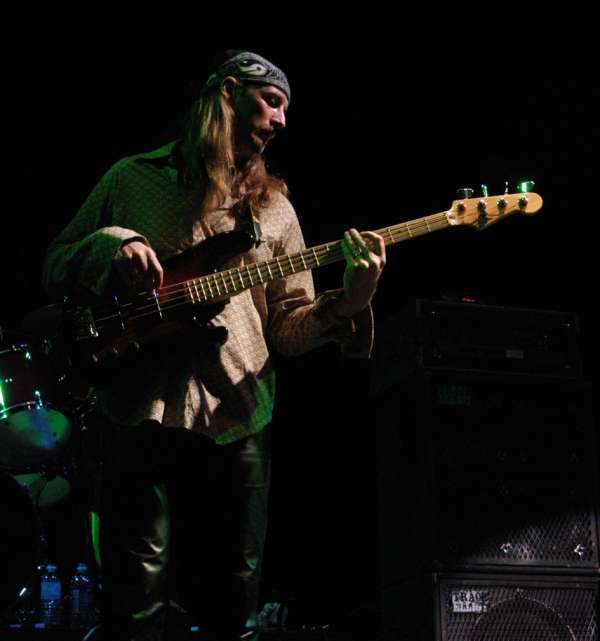
Photo By Chris Walkden
Ian
JH – Why did you choose to play Bass?
Ian – I had a flatmate who played guitar and was into completely different music
to me but had a Bass guitar just sitting around. I used to mess about with a
guitar in my very early teens but then I lost interest in it. I loved listening
to music and I had an older sister who introduced me to bands like Genesis,
Yes, Floyd, and Mike Oldfield. All these bands from the Mid 70’s. So I have
always been a huge music fan. This friend of mine just said why don’t you have
a mess about with this Bass. So we used to have jams and stuff. It was just
an instrument that felt right. I didn’t really play with bands as such. I played
a long with records the way many others started.
JH – Did you used to notice Bass parts before you started playing Bass?
Ian – Not really. Funnily enough I was probably more interested in Keyboards
and Drums. Once I started playing I obviously started picking up on Bass players
such as Chris Squire.
JH – So you have never wanted the limelight of say a Guitarist?
Ian – No my approach has always been from the song writing point of view. It
doesn’t matter at all that I am not a solo player and I am not seen in that
light. I suppose my biggest kick is from the song-writing point of view. I play
quite a bit of acoustic guitar when writing. I also play acoustic on a couple
of song live. But I started with the bass and then moved to the guitar as well.
Basically I see myself as a bass player that plays a bit of guitar as well.
Flat Eric
JH – What is the story behind Flat Eric the Yellow Puppet that is your Mascot?
Rachel –
We bought him at Hopwood Park Service Station on the M42.
Jonathan – We don’t take any questions about Eric do we!
Ian – Yes he should be answering them himself!
JH – Does he now Tour with you?
Ian – Yes he has his own tour bus.
Rachel – And he once got his head slammed in a mini bus door.
Ian – He gets abused quite a bit actually, mainly by the drummer.
Jonathan – He cost us a huge diversion in Holland once because somebody left him
in the hotel room.
Ian – The funny thing is we have seen people turning up at gigs with Flat Eric’s.
Eric’s former job was in some Levi adverts.
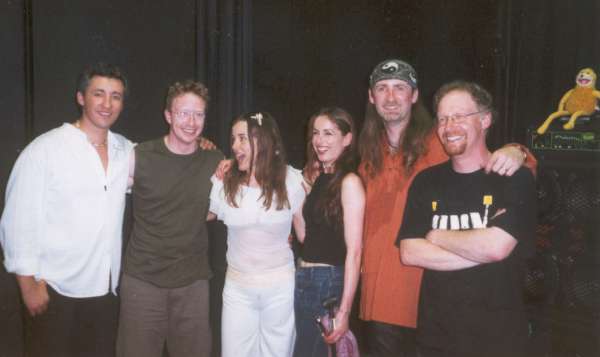
Sadly since this interview was taken Flat Eric has gone walk about. He was
last seen at the Trenton, New Jersey, USA gig. If anyone knows anything about
his disappearance please get in touch with Karnataka
